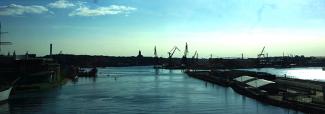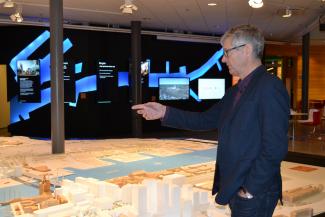Research collaboration – an important heritage from the River City vision
Global challenges such as climate change, political instability and the world economy played a major role when the River City vision was developed. The City of Gothenburg highlights the importance of collaborating with researchers.

When the River City - the largest urban development project in the Nordic region - and Frihamnen was planned, the actors involved faced a number of challenges, one being climate change. A City Structure Adapted to Climate Change Scenarios for Future Frihamnen, Embedded research of the River City process and Formative evaluation of the implementation of the River City vision are all projects that affect the planning and execution of the River City. All are projects that Mistra Urban Futures initiated and fully or partially financed.
"It influenced how residential houses are viewed and planned"
The project A City Structure Adapted to Climate Change Scenarios for Future Frihamnen investigated how the strategies for climate adaptation; attack, retreat and defend can be used in connection with the planning and development of Frihamnen.

- The project was important in the way that it influenced how residential houses are viewed and planned, says Ulf Moback, climate strategy and landscape architect at the City Planning Authority, City of Gothenburg and project manager.
It broadened the discussion to include different types of water level rises, whether climate adaptation in relation to weather, tides or climate change.
- It emphasized the importance of building on safe water levels in order to be protected in the long run and showed that it is possible to get impact in both the media and in people's awareness when showing how to work with climate change adaptation.”
Identified key issues
City developer Bo Aronsson, project manager for the River City Vision, believes that the climate adaptation project was very important in the vision work. In the past, a municipal strategy to meet climate change was simply lacking

- It is an important issue for the city, and it is therefore important to put your foot down and highlight the effects of climate change, he says.
"The effects of the climate adaptation study helped us develop the vision"
The project identified key issues that no one can tackle alone, but everyone must deal with. It's about climate change, the global economy and migration.
- The effects of the climate adaptation study helped us develop the vision and how it could be carried out, which in turn facilitated the practical work with the River City, Bo continues.
Invaluable benefit
The Embedded research of the River City process and the continuation Formative evaluation of the implementation of the River City vision also resulted in useful lessons. During the first project, knowledge was collected for two years which was used in the latter project. Thanks to the collaboration with the researchers, the decision-making parties got a scientific outlook that made them take notice of details that would otherwise be difficult to see.
"It raised the quality of the process when developing the vision"
Bo Aronsson believes that research collaboration, in the form of so-called formative evaluation, and collaboration with Mistra Urban Futures was important to him as project manager for the River City vision.
- It was good to have an independent party outside the project team who documented and reviewed the work critically when we took a new historical direction in Gothenburg’s urban development, he says.
-The feedback we received from the researchers was invaluable. It raised the quality of the process when developing the vision, and so I have always argued how important it is to continue with formative evaluation.
Project facts
A City Structure Adapted to Climate Change Scenarios for Future Frihamnen
Partners: Chalmers University of Technology, University of Gothenburg, IVL Swedish Environmental Research Institute and City of Gothenburg Project period: January 2010 - December 2011
Embedded research of the River City process
Partners: City of Gothenburg, University of Örebro and KFi - Kommunforskning i Västsverige
Project period: January 2011 - December 2012
Formative evaluation of the implementation of the River City vision
Partners: City of Gothenburg and Mistra Urban Futures
Project period: 2014 - 2020